June 30, 1941 in the History of Ukraine and in Yaroslav Stetsko’s Biography
6/30/2021
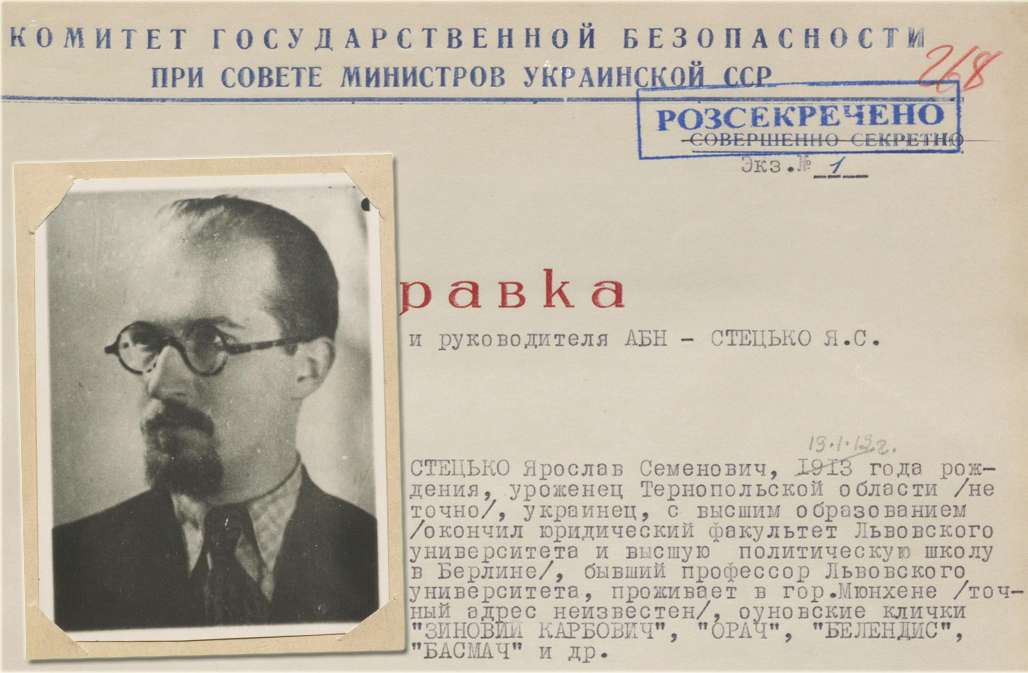
The archives of the Foreign Intelligence Service of Ukraine contain a number of documents that cover some circumstances related to the proclamation on June 30, 1941 in Lviv of the Act of Restoration of Ukrainian Statehood. Soviet intelligence documents relating to the events regarding Yaroslav Stetsko, a leading ideologue of the Organization of Ukrainian Nationalists. NKVD officers opened a case against him in the 1940s. At the same time, intelligence reports, notes, protocols of interrogations of witnesses, memoranda reflect his activities in fragments, starting from his youth.
For example, one of the papers states that “Stetsko Yaroslav Semenovych, born on 19th January 1912, native of Ternopil region, Ukrainian, with higher education (graduated from the Faculty of Law of Lviv University and the Higher School of Political Science in Berlin), former Professor of Lviv University, lives in the city of Munich (exact address unknown), OUN pseudonyms: “Zynoviy Karbovych”, “Orach”, “Belendis”, “Basmach”, etc.” (BSA of the SZR of Ukraine. - F. 1. - Case 13091. - V. 4. - P. 268).
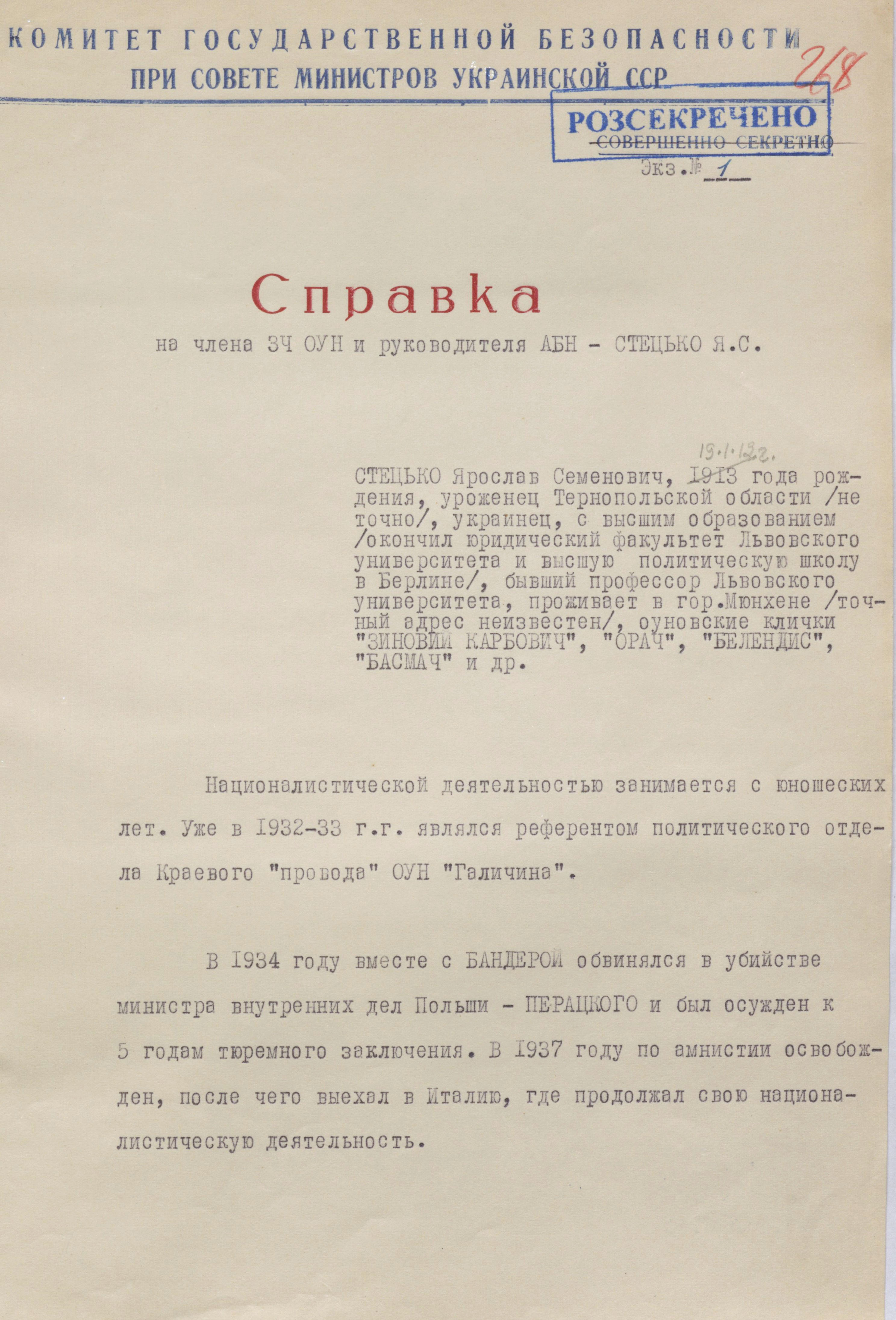
The paper also tells that he had been engaged in nationalist activities since his youth and in 1932–1933 he was an official in charge of the Political Department of the OUN Regional Leadership “Halychyna”. He was the editor of underground publications. In 1936 he was sentenced by a Polish court to five years in prison. In 1937 he was released under an amnesty, after which he left for Italy. While in exile, he was elected a member of the OUN leadership and held the position of ideological officer of the Propaganda Department. After the split in the OUN in 1940, he joined the Bandera’s party and became a member of the OUN Central Leadership, holding the post of Stepan Bandera’s Deputy and Chief of the Political Department.
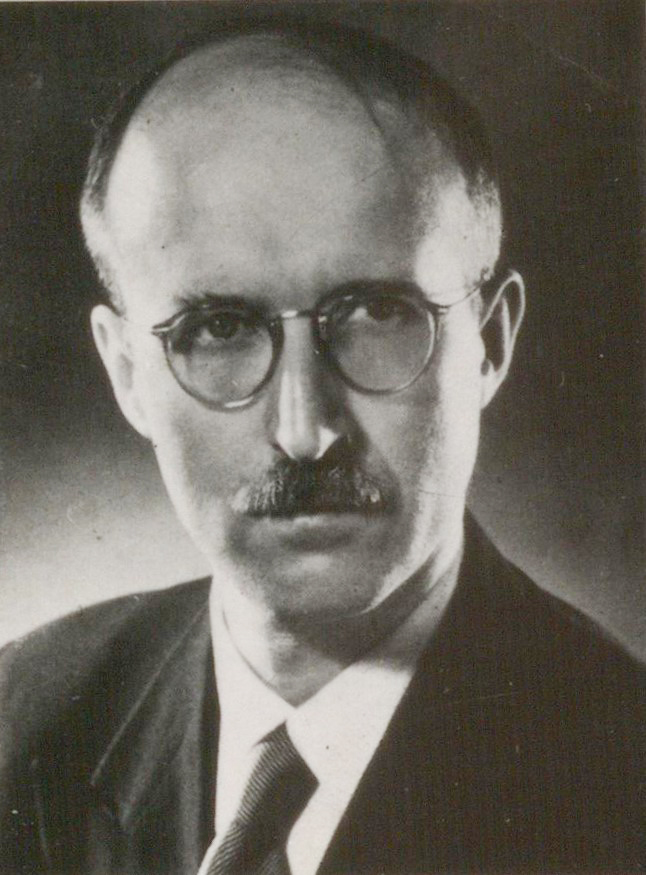 This information was a good reason for the NKVD to take Yaroslav Stetsko into active intelligence cultivation. In the course of the cultivation, the case was filled with various documents, among which a special place was occupied by the information concerning the events of June 30, 1941.
This information was a good reason for the NKVD to take Yaroslav Stetsko into active intelligence cultivation. In the course of the cultivation, the case was filled with various documents, among which a special place was occupied by the information concerning the events of June 30, 1941.
“In 1941, Stetsko arrived in the German-occupied city of Lviv, - the paper reads, - where on behalf of the “leadership” of the OUN he formed the so-called “Ukrainian government”, and on June 30 announced the creation of an “Independent United Ukrainian State” and announced the composition of the “government”.
Historians, based on various sources, have now recreated the events of that day almost hourly. The text of the “Act of Proclamation of the Ukrainian State” is well known. It proclaimed the restoration of the Ukrainian State and called on the Ukrainian people to fight for sovereign power in all national lands, and to establish in western Ukrainian lands the Ukrainian government, subordinate to the future national government in Kyiv.
One of the first decrees signed by Stepan Bandera states: “As the Leader of the Organization of Ukrainian Nationalists, which led the struggle of the Ukrainian people for the United Ukrainian State and suffered numerous losses on the way, I appoint:
To the post of Head of the Regional Government of western regions- Deputy Leader of the OUN Yaroslav Stetsko. The Head of the Regional Government of the Western Regions of Ukraine will summon the remaining members of the Regional Government of Western Regions of Ukraine.
I wish success and endurance in the struggle and work at a new stage.
I express the hope that soon we will have our own power, the Ukrainian State, on the whole Ukrainian land.
Glory to Ukraine” (BSA of the SZR of Ukraine. - F. 1. - Case 13091. - V. 1. - P. 51).
Among the archival documents of the Intelligence, apart from the above-mentioned, materials on the further course of events and the next steps of the Ukrainian government also draw attention. For example, the moods of the people gathered on the occasion of the proclamation of the Act are reflected in the “Report of the National Assembly of Ukrainians of Western Ukraine, which took place on June 30, 1941”. It points out: “All the present greeted this great historical moment with a storm of applause and tears of joy standing, and then sang the National Anthem” (BSA of the SZR of Ukraine. - F. 1. - Case 13091. - Vol. 1. – P. 47).
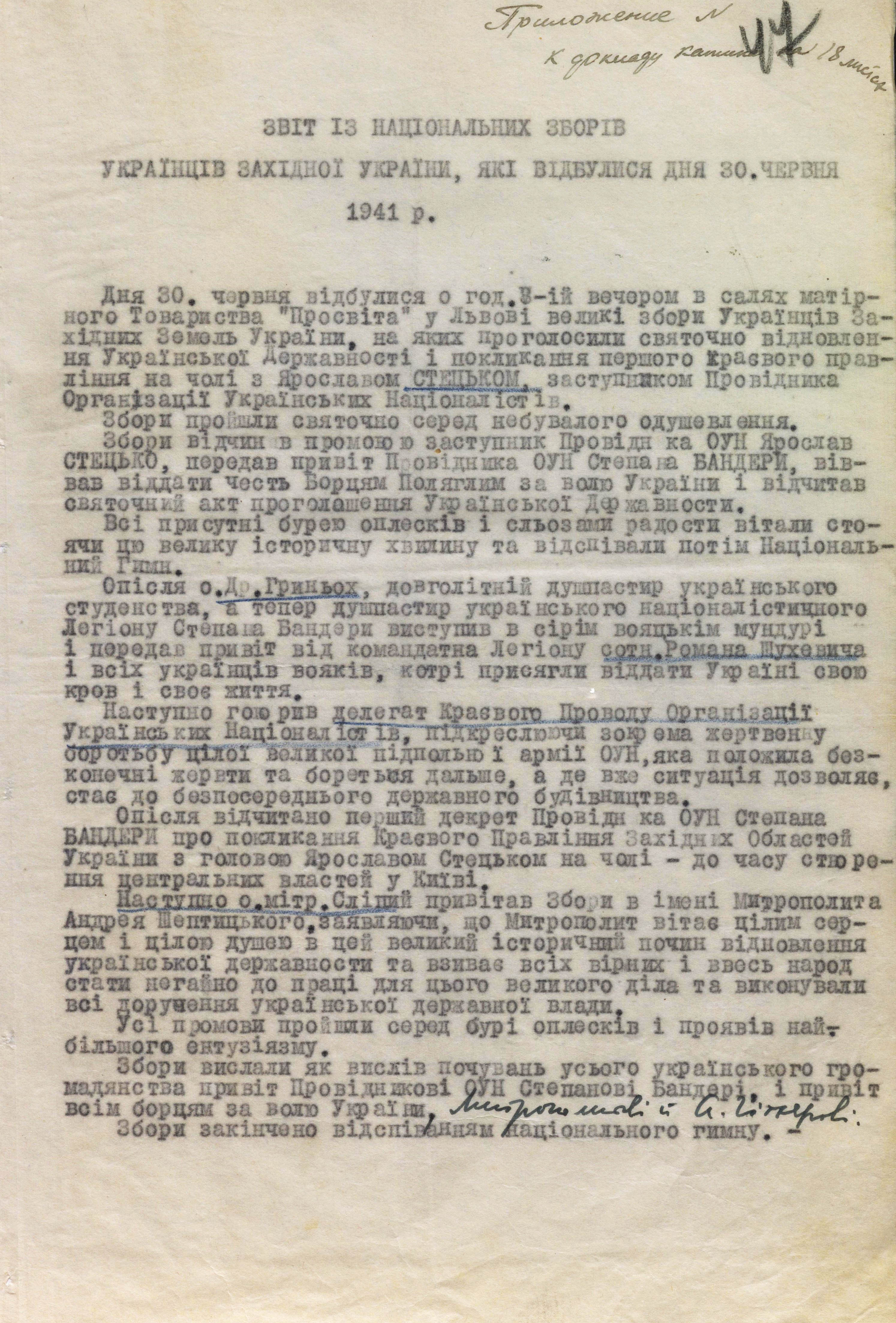
The “Report on the Beginnings of Statehood in Western Ukrainian Lands” tells what happened on 1st July and in the following days: “After the hard times of the Moscow fatigue, one can immediately feel the fresh breath of free life and the lively rhythm of hopeful work. Ukrainian local governments are being organized…, the region is organized, people's viches(assemblies) are taking place everywhere. So far, they cannot be mass, because the existing martial law prevents it”. (BSA of the SZR of Ukraine. - F. 1. – Case 13091. - V. 3. - P. 86). This report is in a package labeled “Trophy Documents”.
The case file contains the original documents on Stetsko’s appointing members of the Ukrainian Provisional State Government, in particular General Vsevolod Petriv, who was instructed to “head the Ministry of Military Affairs”. This is a document dated July 5, 1941, made on a form with the inscription “Ukrainian Government”, sealed by Yaroslav Stetsko’s signature and the seal “Ukrainian National Government”. The staff of the Government was announced that day.
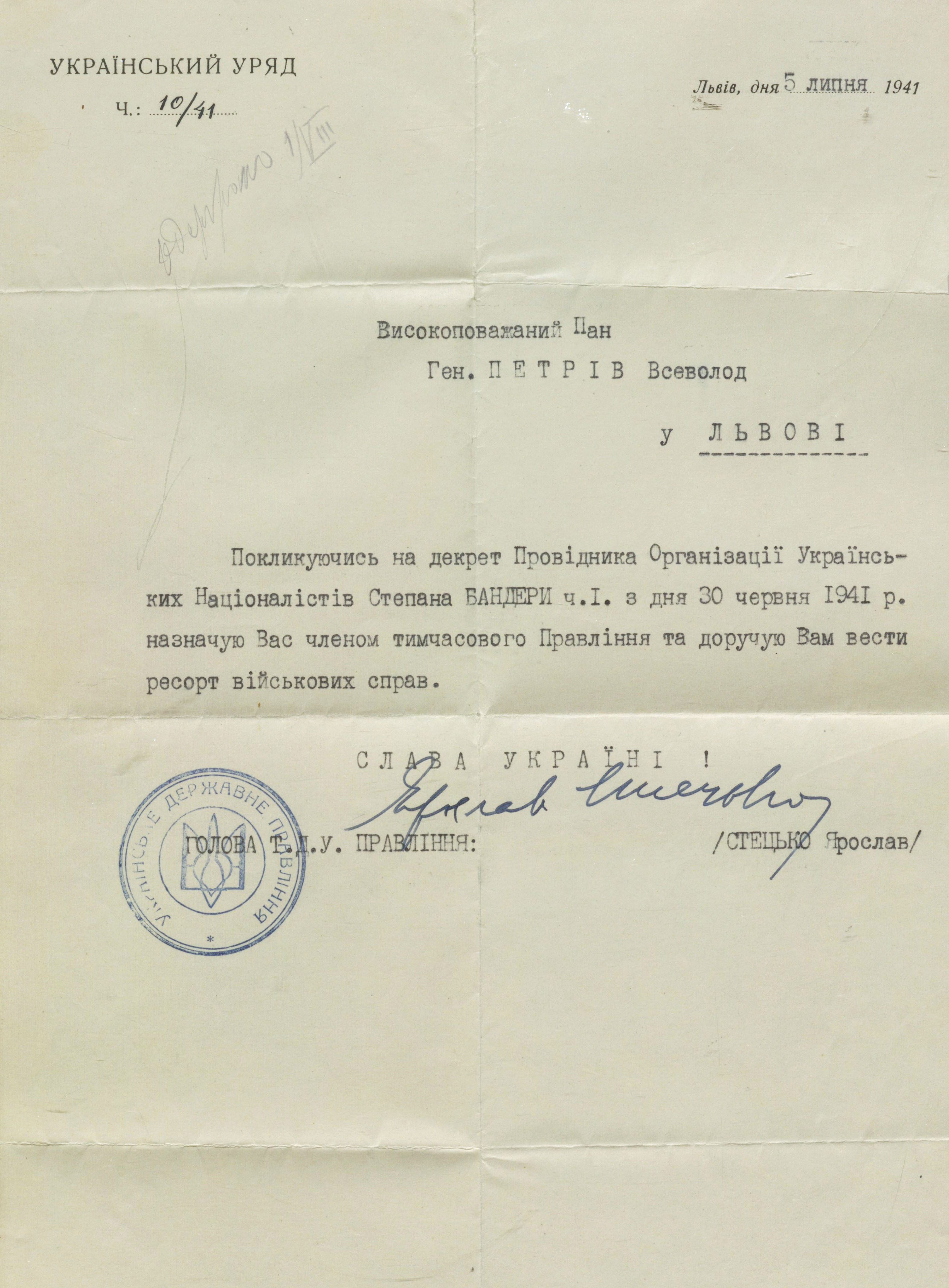
According to the documents, along with the government, there was a so-called “Council of Seniors”. This is stated in the protocol (of August 25, 1944) of the KGB USSR officers’ interrogation of Mykhailo Stepanyak. At one time, he was a member of this structure and was a Deputy of Lev Rebet, a Permanent Representative of the OUN. Here is what he testified during the interrogation:
In the second half of July 1941, after the creation of the “National Government”, i.e. the Government of the Ukrainian Independent State headed by Bandera's first deputy - Stetsko, the so-called “Council of Seniors” was created, which had to reflect the greatness of unanimity and unity of the people with Stetsko’s government, that is why the “Council of Seniors” included only elders among the so-called authorities, representatives of political, public and cultural-educational organizations and institutions.
The “Council of Seniors” did not have legislative rights, but could raise various issues before the “government”. In order for it not to go beyond the interests of the OUN in its proposals, the central “Provid” would send its representative to meetings of the “Council” to protect the interests of the OUN-B.
The permanent representative of the OUN there was "Rebet" (BSA of the SZR of Ukraine. - F. 1. - Case 13091. - V. 1. - P. 297).
The Intelligence’s archival documents and other currently known materials and eyewitness accounts show that the proclamation of the Act of Restoration of Ukrainian Statehood came as a surprise to the occupying German authorities. A few days later, after consultations with Berlin, the Gestapo arrested Yaroslav Stetsko, Stepan Bandera, and a number of other figures. After Bandera and Stetsko rejected the Germans' demands to revoke the Act, they both ended up in the Sachsenhausen concentration camp.
But before that, there was an assassination attempt on Yaroslav Stetsko. There are several mentions of this event in archival documents of the Intelligence. In particular, the special report of the KGB of the Ukrainian SSR "On the Attempted Assassination of Yaroslav Stetsko in 1941” with citing the publication in the newspaper “Independent Ukraine” reads:
“It is evident from the report that on July 9, 1941, at about 9 p.m., Stetsko was driving to his sister, who lived in Lviv at 9, Voytykh Street. When the car stopped at the specified address, at the moment of Stetsko's getting out of the car, an unknown man made 4 shots.
None of the bullets hit Stetsko, but the driver of his car Fedir Klymenko’s lips were injured.
Investigative measures taken by the Ukrainian and German police did not help find the terrorist” (BSA of the SZR of Ukraine. - F. 1. - Case 13091. - V. 1. - P. 286).
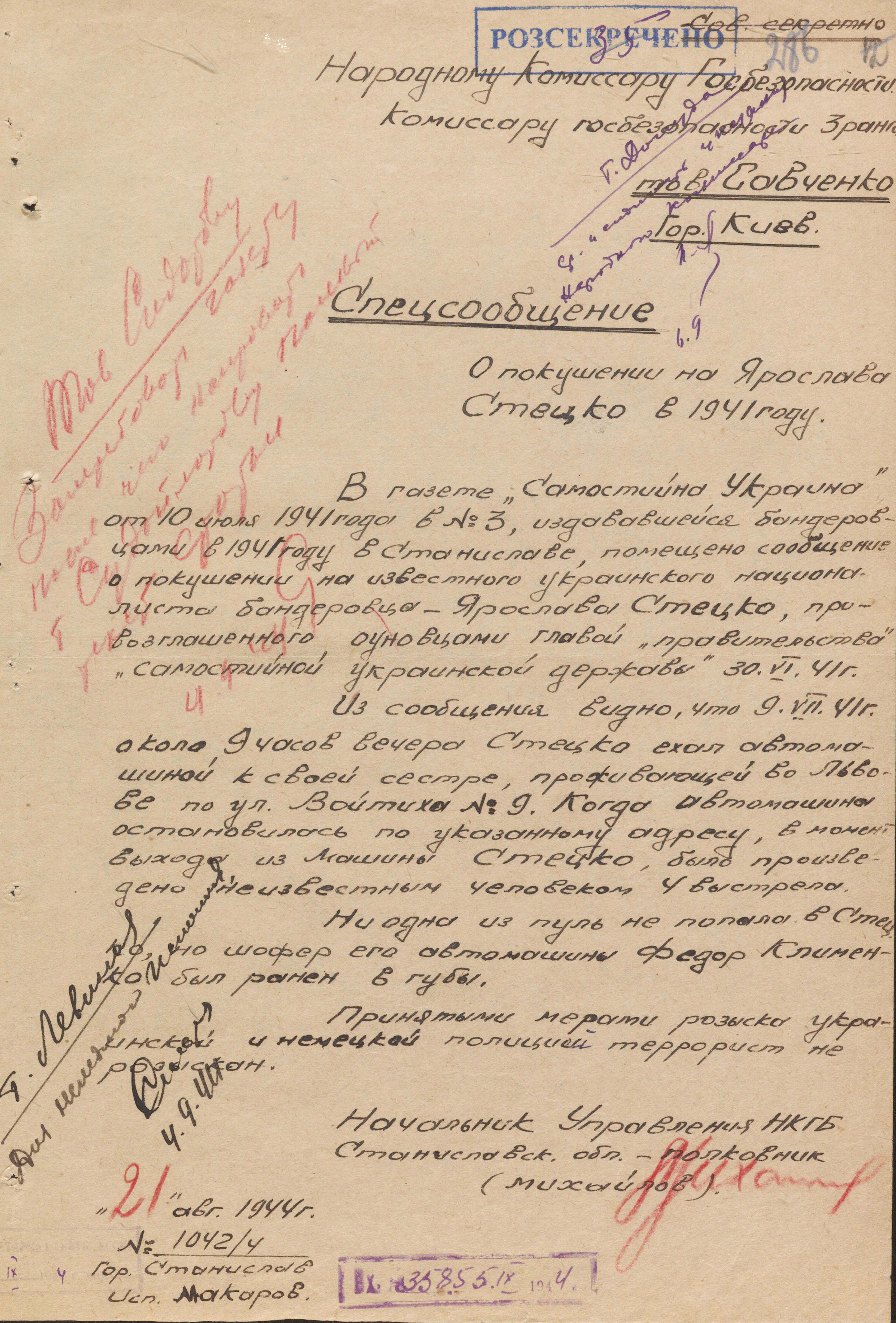
There are different versions of those events. Yaroslav Stetsko himself mentioned that Polish leaflets were found at the site of the assassination, which were supposed to testify to the involvement of Poles in the attempted assassination. However, he doubted this and pointed out: “I don't think that the Poles made that attempt, but rather the NKVD or the Gestapo, because it made no sense for the Poles to do it. And those leaflets could have been fabricated either by the Bolsheviks of the NKVD or by the Gestapo to ignite the Ukrainian-Polish conflict”.
The Nazis soon banned all Ukrainian organizations’ political activities, including demonstrations in support of the June 30 Act. In September 1941, the German security police carried out mass arrests of OUN members. Almost 2,000 people found themselves in prison. In response, the remnants of the OUN –B leadership decided to go underground, intensify anti-German propaganda, and prepare an armed uprising against the occupiers.
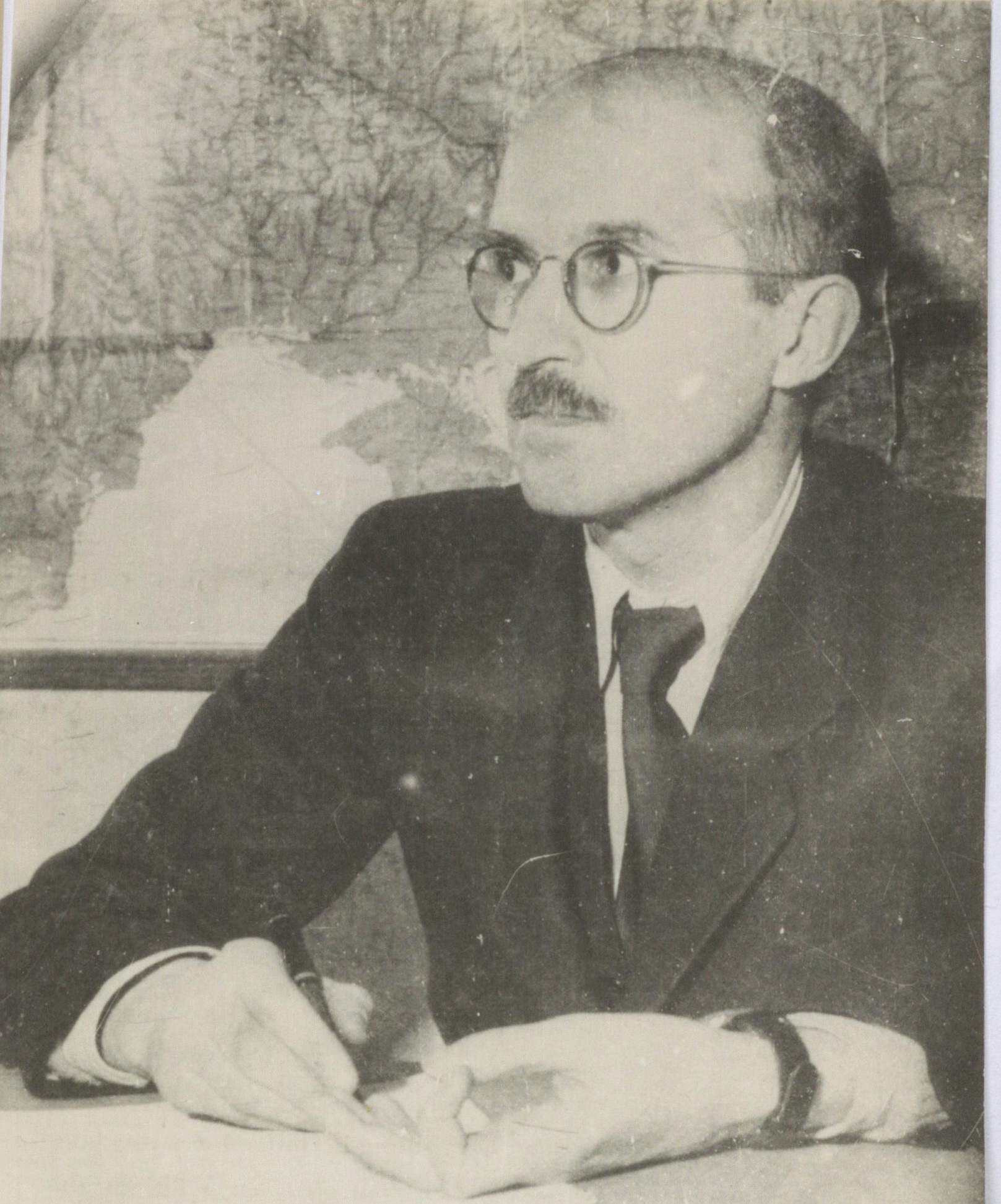 One of the archival documents contains an extract from the underground OUN leaflet “Informant” dated March 8, 1942. It states: “Arrests of those who took part in the creation of the Ukrainian State continue in Kolomyia, about 40 people have been arrested. 3 people have been arrested in Khodoriv, 2 in Proskuriv, and 2 in Pidvolochysk ”(BSA of the SZR of Ukraine. - F. 1. – Case 13091. - Vol. 1. – P. 271).
One of the archival documents contains an extract from the underground OUN leaflet “Informant” dated March 8, 1942. It states: “Arrests of those who took part in the creation of the Ukrainian State continue in Kolomyia, about 40 people have been arrested. 3 people have been arrested in Khodoriv, 2 in Proskuriv, and 2 in Pidvolochysk ”(BSA of the SZR of Ukraine. - F. 1. – Case 13091. - Vol. 1. – P. 271).
The fate of the participants in the proclamation of the Act and those who supported the remarkable event was different. Yaroslav Stetsko spent more than three years in a concentration camp, in particular in the so-called death bunker, in extremely harsh conditions. But he did not change his beliefs and plans to create an Independent United Ukrainian State. Recalling those events, he wrote in the post-war period: “When in defense of the Act of June 30, 1941 we could not use tanks, guns and bombers, that is - a strong army, because of the circumstances - we decided against the tanks, bombers and guns of the occupiers to use the idea of sovereignty, dignity and pride of the great spirit of the nation, the steadfastness of our character, the purity of our heart, our fearlessness to personally defend the proclaimed cause...”.
The June 30 Act testified that Ukrainian statesmen-patriots tried to use every chance given by history to make Ukraine independent.
